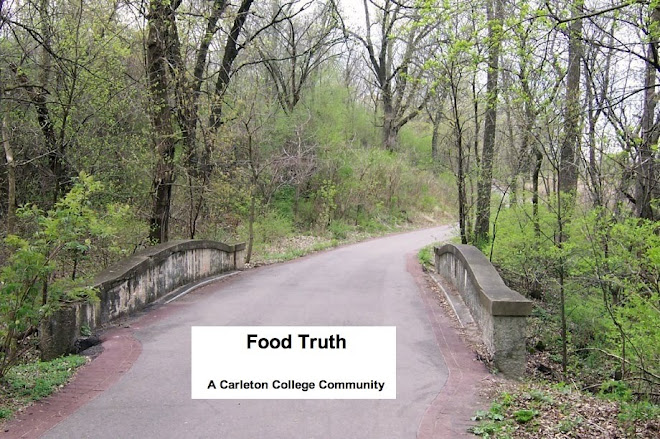What's a better way to spend that "awkward time" after dinner this Friday than coming to participate in a community discussion about expanding the local sustainable food system? Carleton College and St. Olaf College are bringing together students, professors, parents, and food activists in an event led by keynote speaker Holly Lasanga of Bates College in her presentation entitled "Weaving A Sustainable Food Web." From students to parents, farmers to educators, we have already done much to improve the nutrition that Northfield's citizens receive. Friday's presentation will serve as another door to increasing the amount of healthy, sustainable food in the community.
The event will begin at 5:30 PM in Carleton's Great Hall. Carleton and St. Olaf students will present their efforts at promoting nutrition in public schools in the area and initiating movements toward real food on our college campuses. Following, Lasanga will share her personal story about coordinating a three-year sustainable food partnership between Bates and other colleges. The event will conclude with group discussions on thoughts about the next steps the community should take to overcome the challenges and bring more real food to Northfield.
This event is free and open to the public. If interested, please RSVP to Soraya Dangor of Growing Up Healthy, at soraya@growinguphealthy.org.
Thursday, September 22, 2011
Monday, September 12, 2011
Test Tube Meat
To some, eating a burger that was actually manufactured in a lab may sound like a chilling nightmare from Aldous Huxley's Brave New World, but to others, the discovery that in vitro meat may be coming soon to our supermarkets is a cause for celebration. Having recently traveled to laboratories in the Netherlands and North Carolina to observe the progress of tissue scientists in their titanic endeavor, science writer Michael Specter eagerly argues in favor of test-tube meat. Scientists retrieve stem cells from pigs and place them in petri dishes of nutrient-rich broth, and these cells rapidly divide and grow to become meat cells.
Specter explains that animal welfare is a huge part of the motivation for growing meat in labs. "Billions of cows, chickens and pigs would no longer spend their lives force-fed grain and antibiotics or cooped up in factory farms." In vitro meat would also benefit the planet immensely by reducing the amount of global livestock needed, which, "according to the Food and Agricultural Organization of the United Nations, is responsible for nearly 20 percent of all greenhouse-gas emissions. And as the population grows, more resources will be needed to sustain the agricultural industry."
With promising studies such as test tube meat, Thomas Malthus may finally stop churning in his grave.
Read more at http://www.npr.org/2011/08/30/139786731/tube-burgers-the-world-of-in-vitro-meat.
Specter explains that animal welfare is a huge part of the motivation for growing meat in labs. "Billions of cows, chickens and pigs would no longer spend their lives force-fed grain and antibiotics or cooped up in factory farms." In vitro meat would also benefit the planet immensely by reducing the amount of global livestock needed, which, "according to the Food and Agricultural Organization of the United Nations, is responsible for nearly 20 percent of all greenhouse-gas emissions. And as the population grows, more resources will be needed to sustain the agricultural industry."
With promising studies such as test tube meat, Thomas Malthus may finally stop churning in his grave.
Read more at http://www.npr.org/2011/08/30/139786731/tube-burgers-the-world-of-in-vitro-meat.
Subscribe to:
Posts (Atom)
